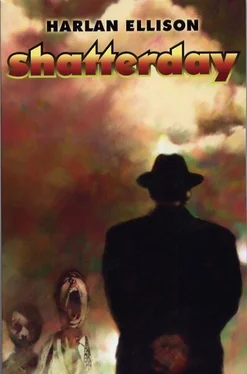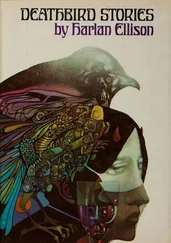I am always startled at the depths revealed in my stories by these erudite critics. I try not to argue with them. I just smile knowingly and respond, “You little devil, you. You found me out!”
The more profound they think they are, the more they require their students to read you; and that means the poor kids have to buy the books containing my stories. And that means a fat and happy life of work, free from the horrors of maybe having to write television scripts. So who am I to say nay, who am I to suggest they’re stuffed topfull of wild blueberry muffins?
What is beginning to unman me is that this plague seems to be spreading to my readers. Now I conceive of all of you as the noblest, wittiest, most intelligent audience in the world. Otherwise you’d be off reading ka-ka like that proffered by Judith Krantz and Sidney Sheldon, to name only two of the creative typists masquerading as writers.
Well, sir. You can imagine my horror and surprise when I received a letter last February from a reader that went like this: [Letter reprinted by permission of James Griffin, Philadelphia, Pa.]
Dear Mr. Ellison:
Last summer I found, by accident, your story “Croatoan” and was disturbed and excited by the resemblances to the sixth book of Vergil’s Aeneid. There were too many to be accidental, but I still couldn’t imagine you following Vergil intentionally, even to the meeting with the man with no hands. I was afraid I had stumbled on something out of the universal subconscious, and felt responsible for doing something about it.
Tonight I browsed through Strange Wine and noticed the references to Isak Dinesen and [Cyril Connolly’s book of essays] The Unquiet Grave. I read the story again and wondered why the comparison of the child to a lemur hadn’t tipped me off. I’m relieved to think you knew what you were doing.
Thanks for giving us, along with a good story, new ways to think about Vergil.
Sincerely yours, James Griffin
What can I say? Humbly, I bow my head and dimple winsomely. Paw the dirt with my hoof, tug my forelock, suck my thumb and murmur aw, shucks. You’re very perceptive. That’s exactly what I was doing. You little devil, you. You found me out!
There’s just one small glitch in the smooth flow.
I’ve never read Vergil’s Aeneid.
The story you are about to read is stuffed full of very conscious symbolism. Catch it now, friends; I don’t do it that often; maybe three times in twenty-five years.
This story was written in direct response to the killing pain of my last wife taking off with another guy. The pain lasted at least twelve minutes, which is the actually recorded duration of genuine’ pain. Everything over twelve minutes is self-indulgence and pointless attempts to make the first twelve minutes seem more important. We are a vainglorious species, and if we were able to cop to the fact that even the most sauvage of what the French call la grande passion commands only twelve true minutes of intense pain before it begins to mellow, we would all dash to the cliffs and do a lemming. So we justify it by enhancing it, by making it seem more important, more consuming. We wander around for twenty years after the affair has broken up, beating our breasts and wailing at the sky.
No nobler than you, I wandered for several months after my last marriage broke up, beating my breast and wailing at the sky, not to mention my friends, who (with uncommon good sense) told me to shut up already. And one night, during a performance of Jacques Brei Is Alive and Well in Paris, a line from one of his wonderful songs struck right to the core of my lost love, and I wrote this story.
I wish to God I could remember what the line was.
“Quae nocent docent.”
Then, and only then, like some mysterious Prisoner in the Iron Mask hidden from everyone’s sight, only then, when the gigantic vessel slipped out of normal continuity and entered the megaflow, only then did the man they called Moth emerge from his stateroom.
As the immense tambour shields rolled down into the body of the vessel, exposing the boiling white jelly that was the megaflow surging past beyond the great crystal ports, the door to his stateroom rolled up and he emerged, dressed entirely in white. Clown-white circles around his dark, haunted eyes. Everyone looked and stopped talking.
The lounge of the gigantic vessel was packed, with voyagers grouped by twos and threes and fours at the bubble tables with their thin stalk supports. Voyagers who had boarded at 4:00, at Now, at Here, at three dimensions—bound for 41:00, for the 85th of February, for Yet To Be, for There, for the last stop before the end of measurable space and time and thought. They looked at Moth and they stopped talking.
Their faces said: Who is this person?
And he walked down among them haltingly; he did not know them. This ship of strangers, and Moth.
He sat down at a table with one empty chair. A man and a woman already sat there. The woman was slim, neither attractive nor unattractive, a mild-looking woman, difficult to discompose. The man looked kind, there were crinkle lines at the comers of his eyes. Moth sat down across from them, as the gigantic vessel hurtled through the megaflow, and the kind-looking man said, “It wasn’t your fault.”
Moth looked sad. “I can’t believe that. I think it must have been my fault.”
“No, no,” the unperturbed woman said quickly, “it wasn’t! There was nothing that could be done. Your son would have died nonetheless. You can’t castigate yourself for believing in God. You mustn’t.”
Moth leaned forward and put his face in his hands. His voice came faintly. “It was insane. Dead is dead. I should have known that… I did know it.”
The kind-looking man reached across and touched Moth’s hand. “The sickness was put on him by God, because of something you had done, you or your wife. It couldn’t have been the child. He was too young to have known sin. But you knew you or your wife were filled with sin. And so your child fell ill. But if you could be as brave as the Bible said you must be, you could save him.”
The calm woman gently pried Moth’s hands away from his face and forced him to look into her eyes. She held his hands across the table and said, “Doctors could not save him… you knew that. God sets no store by science, only faith. Keeping them from the child was necessary. Hiding him in the basement was important.”
Moth whispered, “But he grew worse. He sickened. It was too cold down there, perhaps. I might have let the family do what they wanted, let a physician see him, at least.”
“No,” the kind man said imperatively. “No! Faith cannot be broken. You maintained. You were right. Even when he died.”
“It was holy the way you sat vigil over him,” the woman said. “Day after day. You said he would rise on the second or third day. And you had belief in God.”
Moth began to cry silently. “He lay there. Three days, and he lay there. His color changed.”
“Then a week,” the kind man said. “Faith! You had faith! In a week he would rise.”
“No,” Moth said, “not in a week. Dead.”
“Twenty-one days, a magic number. It would have been on the twenty-first day. But they came and the law made you give him up, and they arrested you, and all through the hearings you insisted on God’s Will, and your good wife, she stood by you through the hatred and the anguish as outsiders reviled you.”
“He never rose. They buried him in the earth,” Moth said, drying his eyes. The clown-white had run down his cheeks.
“So you were forced to leave. To go outside. To get away to a place where God would hear you. It was the right way; you had no other choice. Either believe, or become one with the faithless people who filled your world. You need not have guilt,” the kind man said. He touched Moth’s sleeve.
Читать дальше












